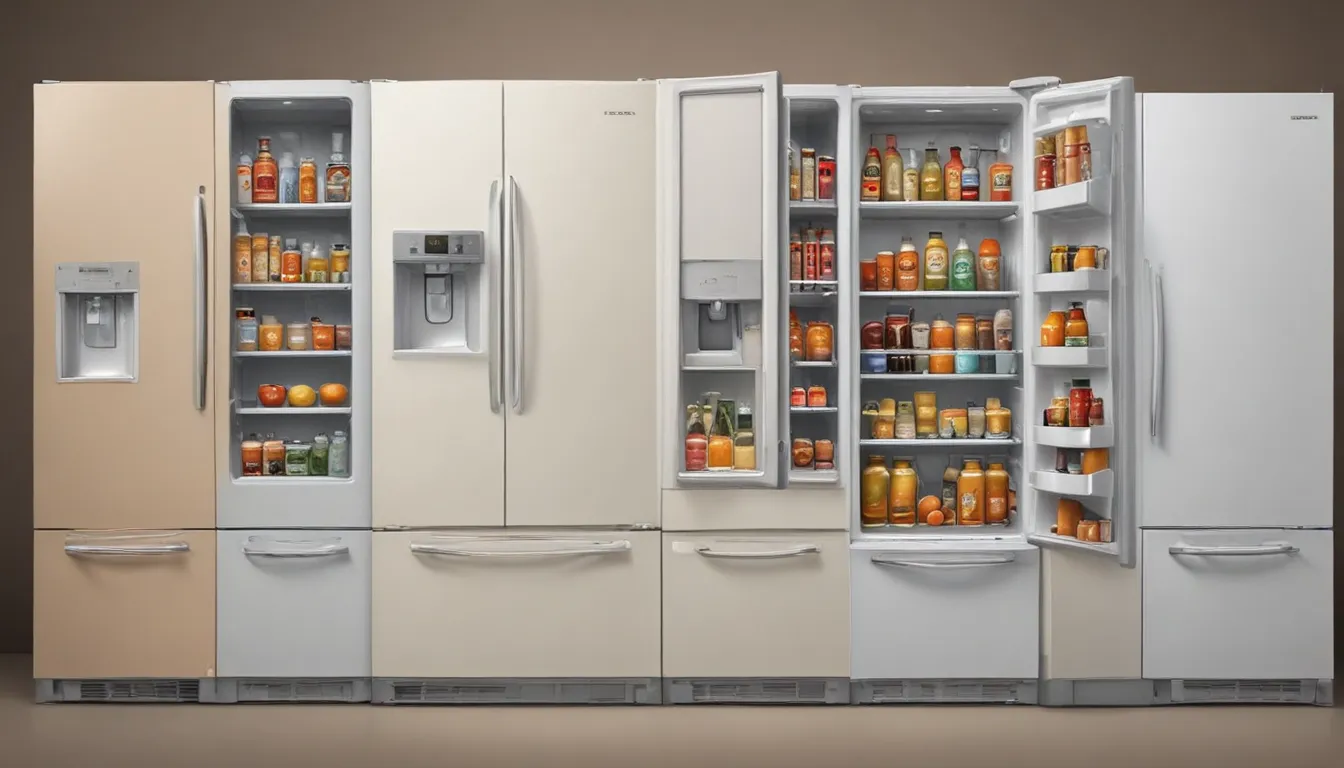A Note About Images: The images used in our articles are for illustration purposes only and may not exactly match the content. They are meant to engage readers, but the text should be relied upon for accurate information.
In the heart of every modern kitchen sits a humble yet indispensable appliance – the refrigerator. From its invention in 1913 to the latest smart features, refrigerators have come a long way, revolutionizing the way we store and enjoy our food. Join us on a captivating journey through 20 fascinating facts about refrigerators, uncovering their impact on daily life and the remarkable technological advancements that have shaped them into the cool companions we know today.
The Journey Begins: The First Home Refrigerator
In 1913, Fred W. Wolf Jr. and his team at the Kelvinator Company invented the first home refrigerator, transforming food storage and preservation in households forever. This pioneering invention paved the way for modern refrigeration technology, setting the stage for the evolution of refrigerators into an essential component of every kitchen.
Revolutionizing Food Storage: The General Electric “Monitor-Top”
The General Electric “Monitor-Top” refrigerator, introduced in 1927, was the first refrigerator to see widespread use. With its innovative design featuring a compressor mounted on top of the cabinet, this model marked a significant advancement in home refrigeration technology, setting a standard for future refrigerator designs.
A Leap Forward: The Introduction of Freon
In the 1930s, the use of Freon as a refrigerant in home refrigerators brought about a major breakthrough in refrigerator technology. This innovation significantly improved the efficiency and safety of refrigeration systems, laying the foundation for the modern refrigerators we rely on today.
Convenience Redefined: The Automatic Defrost Refrigerator
The 1950s saw the introduction of the automatic defrost refrigerator, simplifying refrigerator maintenance for homeowners. This innovative feature eliminated the need for manual defrosting, making refrigerator upkeep more convenient and time-saving.
Energy Efficiency: A Focus on Sustainability
Advancements in refrigeration technology have led to the development of energy-efficient models that consume less power while delivering optimal cooling performance. These energy-efficient refrigerators not only save on electricity bills but also contribute to sustainable and eco-friendly practices in the home.
Style and Functionality: A Range of Choices
From traditional top-freezer models to sleek French door refrigerators, consumers today have a wide array of options to choose from based on their specific needs and preferences. The diverse styles and configurations of refrigerators allow for customization to complement different kitchen layouts and design aesthetics.
Smart Features: The Rise of Intelligent Appliances
The integration of smart technology in refrigerators has led to the emergence of intelligent appliances equipped with features such as touchscreen displays, Wi-Fi connectivity, and advanced temperature control. These smart refrigerators offer enhanced convenience and connectivity for modern households, revolutionizing the way we interact with our appliances.
Ice Maker Innovation: Simplifying Ice Production
The integration of built-in ice makers in refrigerators has revolutionized the way we produce ice for beverages and culinary use. This convenient feature eliminates the need for separate ice trays, making ice production a hassle-free experience in many modern refrigerator models.
Hydration Made Easy: Water Dispensers in Refrigerators
Refrigerators with water dispensers provide added convenience by allowing easy access to chilled water without the need for a separate filtration system or pitcher. This feature enhances the functionality of the refrigerator as a hydration hub in the kitchen, promoting easy access to refreshment.
Organization for Freshness: Maximizing Food Quality
Proper organization and storage in refrigerators play a crucial role in prolonging the freshness of food items. By utilizing designated compartments for different food categories and following recommended storage practices, individuals can optimize the shelf life and quality of items stored in the refrigerator, minimizing food waste and ensuring a well-stocked kitchen.
Safety First: Ensuring Food Safety
Maintaining the appropriate temperature in the refrigerator is essential for preventing food spoilage and minimizing the risk of foodborne illnesses. Adhering to food storage guidelines and best practices can help ensure that the refrigerator serves as a reliable tool for preserving food safety and quality.
Essential Maintenance: The Key to Performance
Regular inspection and maintenance of refrigerator seals, also known as gaskets, are crucial for maintaining the efficiency of the appliance. Damaged or worn seals can lead to energy loss and compromised cooling capabilities, underscoring the importance of routine seal maintenance for optimal refrigerator performance.
Ventilation Matters: Promoting Efficiency
Proper ventilation around the refrigerator is essential for facilitating heat dissipation from the condenser coils and promoting optimal cooling performance. Adequate airflow contributes to the longevity and effectiveness of the refrigerator, ensuring efficient operation and preservation of food quality.
Energy-Saving Tips: Promoting Efficiency
Simple practices such as minimizing door openings, allowing hot foods to cool before storing them in the refrigerator, and avoiding direct sunlight exposure can help reduce refrigerator power consumption. These energy-saving tips not only contribute to lower electricity bills but also promote eco-conscious living.
Eco-Friendly Features: A Sustainable Approach
Modern refrigerators often incorporate eco-friendly elements such as LED lighting, energy-efficient compressors, and refrigerants with lower environmental impact. These eco-conscious features align with the industry’s commitment to sustainability, providing environmentally friendly options for consumers seeking greener choices.
Responsible Disposal: Environmental Considerations
Proper disposal of old refrigerators is essential for environmental safety due to the presence of refrigerants and potentially harmful components. Recycling programs and professional disposal services offer sustainable solutions for retiring refrigerators, ensuring that they are handled responsibly and in an environmentally friendly manner.
Enhanced Efficiency: The Era of Smart Refrigerators
Smart refrigerators equipped with features like inventory tracking, recipe suggestions, and integration with smart home systems enhance kitchen efficiency and connectivity. These innovative appliances streamline kitchen operations and elevate the culinary experience for users, offering a seamless and technologically advanced approach to food storage and management.
Continual Innovation: A Bright Future Ahead
The ongoing innovation in refrigeration technology, from energy efficiency to smart capabilities and sustainable design, reflects the evolving nature of refrigerators to meet the changing needs and expectations of modern consumers. As refrigerators continue to adapt and improve, they remain a cornerstone of convenience, efficiency, and sustainability in our daily lives.
Conclusion: The Marvels of Refrigeration
Refrigerators have come a long way since their inception, evolving into sophisticated appliances that are essential in modern homes. Understanding the history, technology, and maintenance of refrigerators is key to maximizing their performance and longevity. From their environmental impact to their practical applications, refrigerators continue to play a vital role in food preservation, storage, and convenience in our lives.
FAQs: Your Refrigerator Questions Answered
-
What factors should I consider when buying a refrigerator?
When purchasing a refrigerator, consider size, energy efficiency, and special features that align with your needs. Assessing your kitchen layout can help determine the most suitable refrigerator style and configuration. -
How can I optimize the energy efficiency of my refrigerator?
To maximize energy efficiency, ensure proper ventilation, set the temperature correctly, clean the coils, minimize door openings, and promptly address any seal issues to save energy and reduce electricity bills.
Embark on a journey through the world of refrigeration, exploring the historical milestones, technological advancements, and practical considerations that make refrigerators an indispensable part of our daily lives. Whether you’re in the market for a new fridge or simply curious about the fascinating world of refrigerators, there’s always more to discover about these cool companions that have transformed the way we store and enjoy our food.






